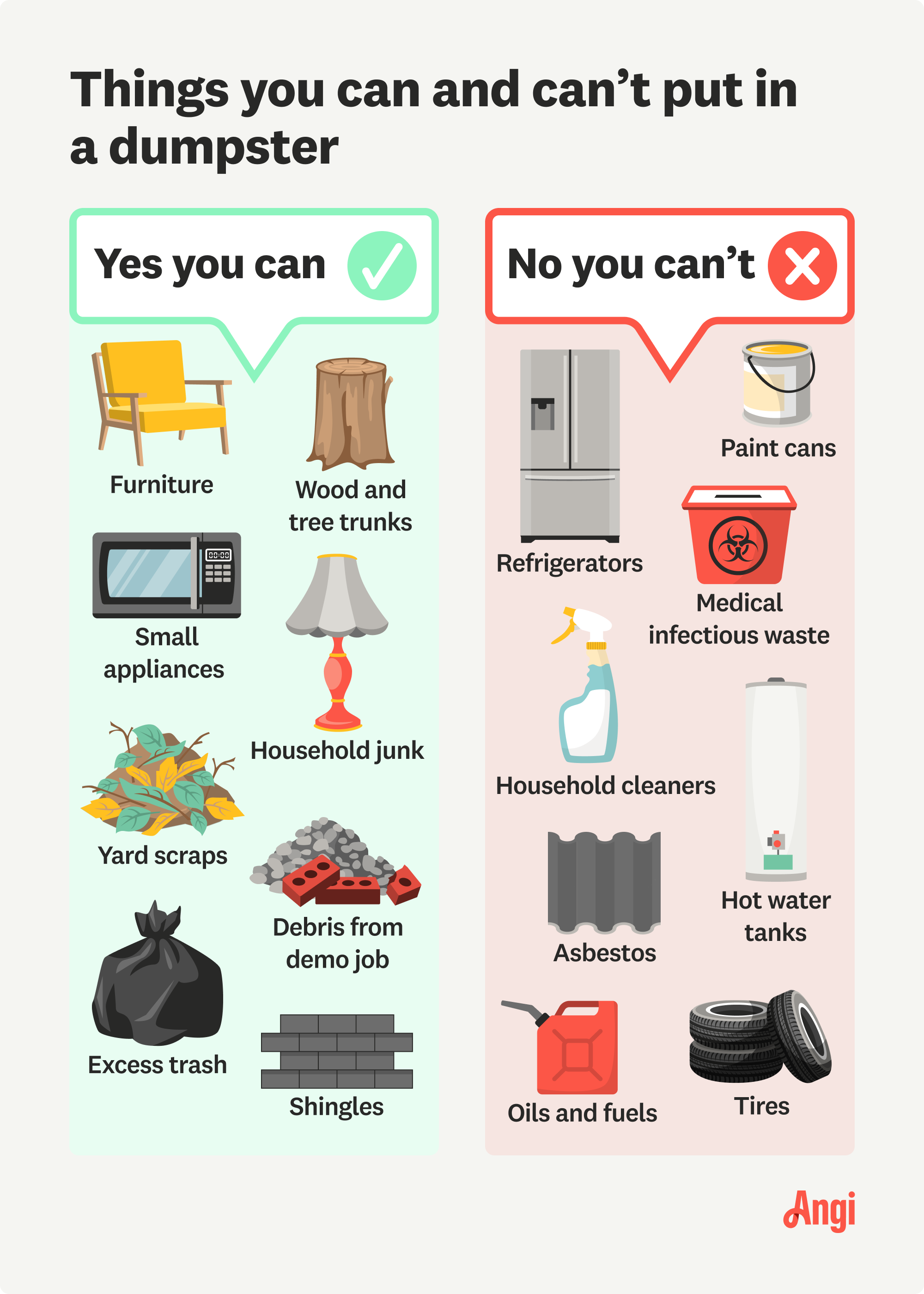
Mattresses are considered hazardous waste, so you’ll likely have to pay disposal fees. Use this guide on mattress removal costs to see what your total will be.
A garbage removal company is your best bet for safe disposal of old paint


Over the years, you’ve accumulated dozens of half-full paint cans, and you know they’re considered hazardous waste, so where do you turn? Your best option is to hire a local garbage removal professional who disposes of old paint and other hazardous waste. You’ll just need to find one with a license for transporting hazardous waste from your local Department of Transportation.
There are a few key benefits to hiring a garbage removal professional who disposes of hazardous waste to get rid of old paint cans:
Avoids illegal dumping fees: Paint containers and spray paint aerosol cans are considered hazardous waste. Getting rid of hazardous waste improperly, even if it’s unknowingly, is subject to fines if you’re caught. While it might be tempting just to ditch them in your regular garbage, you could see fines of up to a few thousand dollars if you're caught doing so. Hiring a garbage removal company that removes hazardous waste is a good way to ensure you’re disposing of your waste legally and safely.
Keeps your car clean: Many municipalities have no-cost programs for disposing of household hazardous waste, including old paint. Transporting the debris in your car takes time and could damage the interior if the cans leak or aren’t closed properly.
Gets the trash out immediately: Free programs for getting rid of hazardous waste are often only scheduled monthly or even quarterly. Hiring a professional garbage removal company means you can get your space cleaned up immediately without having to wait for the next program date.
Gets rid of other hazardous waste in the process: If you have other hazardous waste lying around—like household cleaners, pool chemicals, electronics, and light bulbs—most garbage removal companies that specialize in removing hazardous waste should also be able to pick up that debris.
Helps keep the environment clean: Illegally dumping hazardous waste—which includes placing it in your normal trash—can be detrimental to the environment, as it can release volatile organic compounds (VOCs) into the air and leach chemicals into the soil and water at dump sites. Hiring a professional trash removal service is a good way to avoid any detriment to the world around you.
It’s not advised to place hazardous waste materials in your dumpster without first consulting your dumpster rental company. If these items make their way to the landfill, they (in most circumstances) will be returned to you, and you will face a fine of up to $500.

In most cases, you can’t dispose of old paint or paint cans in a dumpster. Old paint is considered hazardous waste, and most dumpster companies don’t allow you to get rid of hazardous waste in their dumpsters. If they find out you put paint cans into one of their dumpsters, they’ll likely return the waste and charge you a fee for illegal dumping.
Some dumpster companies will deliver dumpsters specifically for hazardous waste, in which case you can put old paint inside for disposal. Before renting, make sure to double-check with your dumpster company what you can put in the dumpster.
Garbage removal companies with a license to transport hazardous waste will come to your home to collect the old paint and other waste. They’ll then secure the hazardous waste—which may involve sealing and locking the truck or encapsulating the waste in plastic sheets—and deliver it to a facility specializing in recycling. If it can’t be recycled, they’ll dispose of the waste in whichever way the local municipality mandates.
Junk removal costs an average of $250, but expect to pay a little more for hazardous waste disposal. The price depends primarily on the amount and type of waste, and your location also plays a factor, especially if your pro has to travel a long distance from your home to the proper disposal facility.

Yes, it is possible in most areas to dispose of old paint yourself. You’ll often have two options. First, you could pay for hazardous waste dumping if you have a dump near you that accepts old paint. Second, you could find a local program that collects hazardous waste for safe disposal.
In both cases, you’ll usually have to transport the old paint cans in your car and might have to pay special dumping fees. The cost of hazardous waste disposal depends on your location and the facility.
You can save time—and, potentially, your car's interior—by hiring a garbage removal service near you that handles hazardous waste removal.
From average costs to expert advice, get all the answers you need to get your job done.

Mattresses are considered hazardous waste, so you’ll likely have to pay disposal fees. Use this guide on mattress removal costs to see what your total will be.

Get clear answers on oil tank removal costs, including average prices, key factors, and ways to save. Learn what impacts your project and how to budget.

Need to get rid of paint, solvents, or other chemicals? Use this guide on hazardous waste disposal costs to see what professional removal will cost.

If your home is brimming with things you don’t need, find out about your options when it comes to how to get rid of trash, from junk collection to recycling.

Fire extinguishers don’t last forever, but you can’t just throw them in the trash. Learn how to dispose of a fire extinguisher safely and correctly.

There are tons of things you can recycle instead of throwing away, just be sure to follow proper protocol.